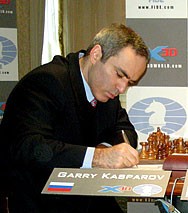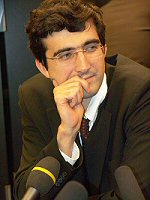|
 |
The Day
Kasparov Quit
and other chess interviews
by Dirk jan ten
Geuzendam
Reviewed by
Prof. Nagesh Havanur
New In Chess, 2006
ISBN: 90-5691-163-5
softcover, 344 pages |
 Dirk
Jan ten Geuzendam, the author of this book needs no introduction. He
is Editor-in-chief of New in Chess Magazine. I
made my first acquaintance with his writing when I read his book Finding
Bobby Fischer (Interchess BV 1994), a collection of interviews with
celebrities of chess, which originally appeared in New in Chess
magazine. The interviewees included, among others, past legends like
Botvinnik and Smyslov and members of the present generation like Kasparov
and Anand. Dirk
Jan ten Geuzendam, the author of this book needs no introduction. He
is Editor-in-chief of New in Chess Magazine. I
made my first acquaintance with his writing when I read his book Finding
Bobby Fischer (Interchess BV 1994), a collection of interviews with
celebrities of chess, which originally appeared in New in Chess
magazine. The interviewees included, among others, past legends like
Botvinnik and Smyslov and members of the present generation like Kasparov
and Anand.
The book was a revelation, an
extraordinary glimpse of the inner lives of chess masters. Only the
abortive interview with Fischer that came in the end was a bit of
disappointment. It was, nevertheless, worth the effort. This
book is a sequel and has a similar format.
 If
Fischer dominates the scene in the first book, it is Kasparov who dominates
in the second. If
Fischer dominates the scene in the first book, it is Kasparov who dominates
in the second.
As for the present day elite, the
interviews with Leko, Ivanchuk and Judith Polgar are interesting. So
are the interviews with past masters, like Najdorf, Bronstein and Korchnoi.
But surely, we could have been spared interviews with the likes of
Ilyumzhinov, Azmaiparashvili and Norwood.
There are also notable omissions like
Shirov, Topalov and Morozevich. The omission of Shirov is all the more
unfortunate as he is roundly criticized by both Kasparov and Kramnik in
their interviews. Shirov did not figure in the previous book of NiC
interviews (Finding Bobby Fischer) either. So it
appears that there is no way of his countering the accusations leveled
against him by Kasparov and Kramnik in New in Chess.
I found Kasparov’s interviews in the
aftermath of his World Championship Matches with Anand and Kramnik
revealing. He is entirely unapologetic over his unsporting behaviour
with Anand during the 1995 Match. The way he gloats over his victory
hardly shows him in favorable light. In his interview Anand responds
to Kasparov with dignity and grace.
Kasparov is entirely different in his
interview taken immediately after the painful defeat in the hands of
Kramnik. He laments missed opportunities and also deplores the
negative approach of Kramnik. The latter is, of course, unrepentant
over his match strategy.
Where did you follow this generally
defensive strategy?
I follow ice hockey a bit, and the Czech
national team has been winning everything the last couple of years.
The Olympics, championships, everything. But they never score more
than two goals. Which is not normal for ice hockey. They
always win 2-0, 1-0, or 2-1,all the time. They don’t show any
brilliancy, but they win all the events. The Russians may win their
matches 8-1 or 10-2, but they will lose 0-1 against the Czechs in the
final. Then nobody cares any longer how much the Russians scored in
previous matches because in he decisive match they are helpless. The
Czechs have a very solid defence…. Their strategy is clear.
They have been doing this for years and nobody can do anything. I
thought okay, it’s a different game but the approach is very interesting.
And that’s how I chose this defensive approach….
Kasparov calls you the champion of
the new generation, a very pragmatic generation in pragmatic times.
He drew a parallel with the stock trade. The quality of the product
doesn’t matter too much as long as the result, the stock rates are okay.
No. I think he confuses me with
someone else… It has nothing to do with pragmatism…. You have known
me for a long time and know that I have always cared for a lot about the
level of my play. The way I play. There are chess players who
don’t care about this at all and simply count their points. That’s
not me. But this was the world championship match and I wanted to win it
very much. I simply had to forget about all this brilliance and win.
I was pragmatic in this match, but I am not very pragmatic in general, I
just have a different approach to chess, different views. I believe
that chess is a defensive game in general. If you defend well this
is more effective than attacking all the time…. Perhaps this is why
I make many draws.
All this is very reminiscent of the late
world champion Tigran Petrosian. He had adopted the same strategy
against Botvinnik in their 1963 match. Poor Botvinnik never recovered
from the defeat. This negative attitude is reflected in yet another
interview:
|
 |
I am sorry, but we are not businessmen. It’s not
a commercial deal where you earn some money and have to deliver some
goods. We are also artists in a way. I am good enough to
do what I want to do and to play how I want to play. I think I
have deserved this right in my career. A painter never asks
people what they want to see. He paints. If somebody
doesn’t like it, he doesn’t like it. It’s art, you do what you
think is right. Or a musician, he doesn’t play the way the
public wants him to play, he plays the way believes is right.
And if he is not popular, he is not popular. There is nothing
arrogant in this, it’s a creative approach. |
What Kramnik says in effect is that an
artist is a law unto himself. There are no standards, save the ones
set by him. He has no responsibility towards the public and it has no
right to ask him questions.
But, is he right? All artists, be it
painters, musicians or chess players are public performers. If they do
not care for public opinion, they can play in the privacy of their homes to
their hearts’ content. The public would not bother about them.
But once they enter the public domain, they are bound to follow norms and
standards. They can not get way with the kind of insolence shown by
the likes of Kramnik.
I think Geuzendam treats the two Ks with
deference they do not deserve.
Nevertheless, this book is a revelation of
different kind. In the first book Finding Bobby
Fischer we were treated to interviews with dedicated world champions
like Botvinnik and Smyslov and now we have Kasparov and Kramnik. One
believes that the chess public should exist only to extol his glory and the
other thinks that it need not even exist.
Amen.
Recommended
|

The
Chessville
Chess Store


Chess

The
Chessville
Weekly
Newsletter

Subscribe
Today -
It's Free!!
The
Chessville
Weekly
Archives

Advertise
with
Chessville!!
Advertise to
thousands
of
chess
fans
for
as little
as $25.
Single insert:
$35
x4 insert:
@ $25 each.

From the
Chessville
Chess Store



From the
Chessville
Chess Store
|


 Dirk
Jan ten Geuzendam, the author of this book needs no introduction. He
is Editor-in-chief of New in Chess Magazine. I
made my first acquaintance with his writing when I read his book Finding
Bobby Fischer (Interchess BV 1994), a collection of interviews with
celebrities of chess, which originally appeared in New in Chess
magazine. The interviewees included, among others, past legends like
Botvinnik and Smyslov and members of the present generation like Kasparov
and Anand.
Dirk
Jan ten Geuzendam, the author of this book needs no introduction. He
is Editor-in-chief of New in Chess Magazine. I
made my first acquaintance with his writing when I read his book Finding
Bobby Fischer (Interchess BV 1994), a collection of interviews with
celebrities of chess, which originally appeared in New in Chess
magazine. The interviewees included, among others, past legends like
Botvinnik and Smyslov and members of the present generation like Kasparov
and Anand. If
Fischer dominates the scene in the first book, it is Kasparov who dominates
in the second.
If
Fischer dominates the scene in the first book, it is Kasparov who dominates
in the second.










